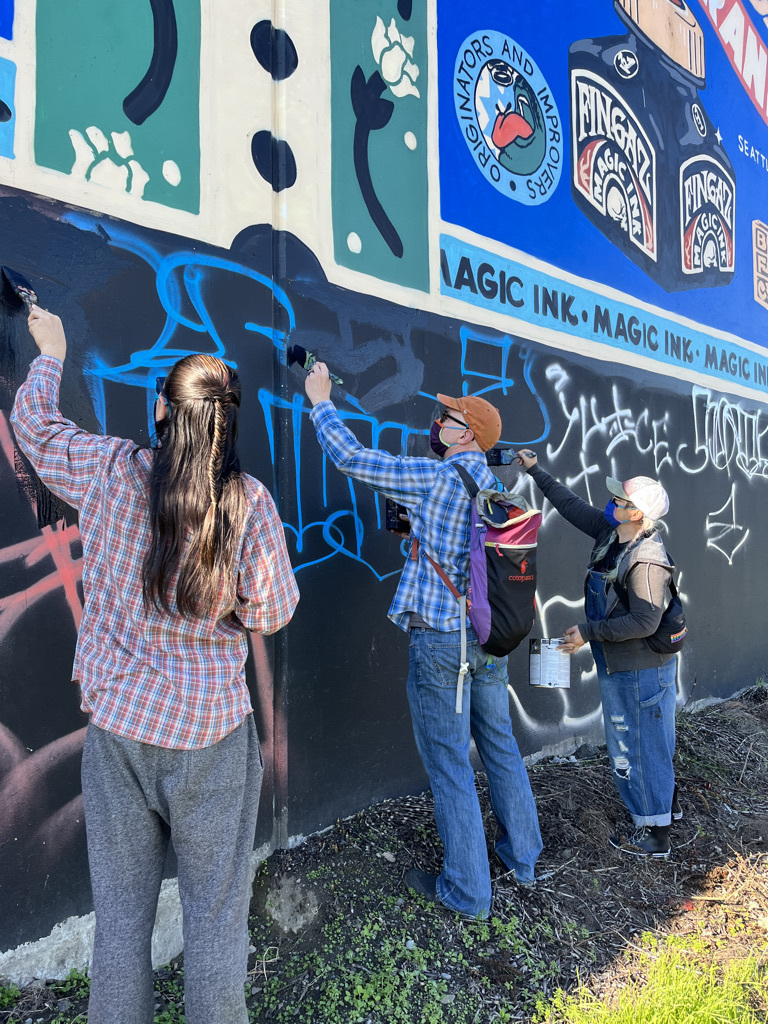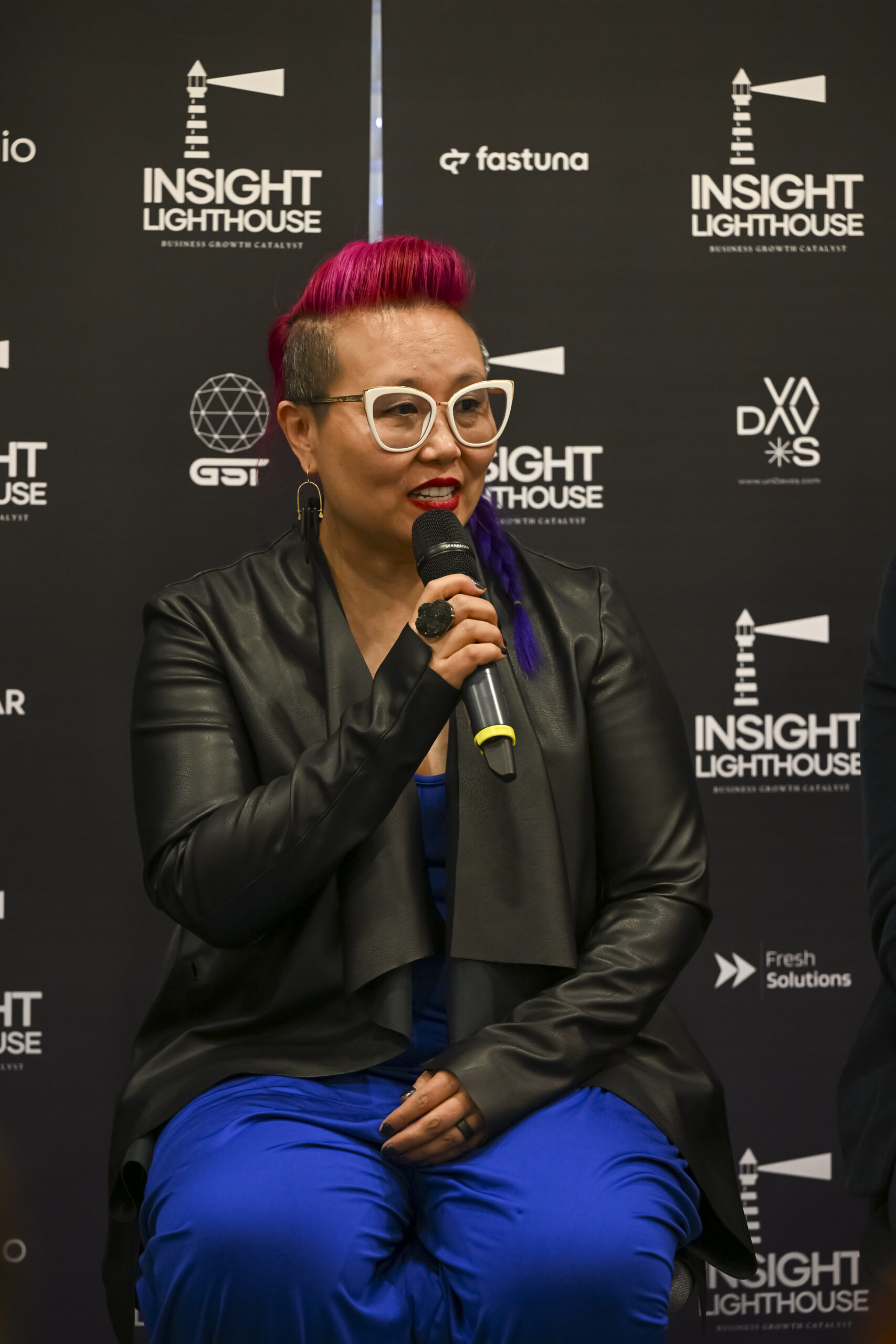We had an inspiring conversation with our Board Chair Kim “Kimfer” Flanery-Rye about her time at the World Economic Forum and Cannes Lions, her work as a DEI practitioner and business owner, and, of course, her role with Urban ArtWorks! In October, Kimfer will conclude her board service term, and we’re so grateful for her leadership. Kimfer has played a pivotal role in Urban ArtWorks’ journey over the past four years, and we’re excited to share some of our conversation!
KIM “KIMFER” FLANERY-RYE
Kimfer is passionate about diversity, equity, inclusion, and women in business. She is the Founder of Inclusion Equals, a social enterprise focused on the IDEA: Inclusion = Diversity + Equity + Accessibility to build culture from the inside out, as well as the CEO of The FBomb Breakfast Club, a peer support community for women, femmes, and gentlethems who are company founders and business owners. She is also an Adjunct Professor teaching Creativity and Innovation for MBA students, and has her MBA in Executive Leadership. She speaks locally, nationally, and globally and has most recently spoken at the 2022, 2023, and 2024 World Economic Forum regarding the importance of women on boards and what it means for women to have power, authority, and agency as well as DEI’s role in AI and the future of work, as well as spoken at the Cannes Lions International Festival of Creativity about how creativity has no age limit. In addition to her work, she has served on boards as the Board Chair and has been the first DEI Chair for several organizations.
Kimfer with other current and previous Urban ArtWorks board members at Brush and Brunch in 2023.
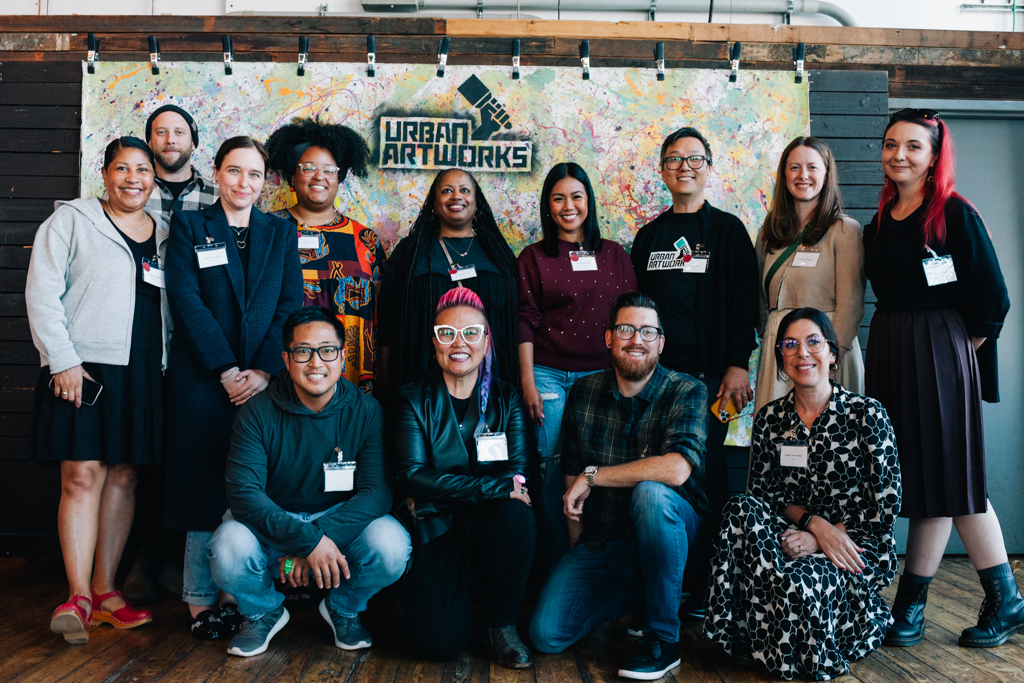
Can you share how you became involved with Urban ArtWorks, and what inspired you to join the board?
Back in 2007, I had a store supporting local artists and designers around the Pacific Northwest, and I actually had a small fundraising event for Urban ArtWorks through the store. Then, when I went to get my executive MBA, I took a sabbatical from my executive position at an award-winning digital marketing agency. During that sabbatical, I had a bucket list of things I wanted to do while I was finishing my MBA. One of the items on the bucket list was to serve the community by joining a nonprofit board.
There are three areas that are really important to me; youth facing barriers, LGBTQIA+ community, along with the arts. Urban ArtWorks serves all three and since I’ve been following Urban Artworks for so long, I thought it was a perfect match.
I was recruited by our former Board Treasurer, so when I applied, one of the things that I had asked was, “Do you have a DEI chair? It looks like you don’t have one, but I would love to serve as one.” With that, I became the first DEI chair in Urban ArtWorks twenty-something years in history. I served as the DEI chair for one year and then I became the Board Chair in the second year. I’ve been serving for the past 4 years, and 3 of them as the Board chair. I’m sad to say it’s my last year as a Board Chair because of the term limits outlined in our Board By-Laws.
In January of this year, you attended the World Economic Forum Annual Meeting (WEF) in Davos, Switzerland. As a professional with a background in art and communication, how did you find your experience?
Part of the reason I was initially invited was because of my DEI background, and less to do with my arts and communication background. I met some lovely women through a peer group called “Wonder Women Dinners.” I met a super awesome person named Vani Rao and she and I conversed about the importance of women needing to be on boards. At the time, she worked for a Venture Capital fund (VC) that was focused on women business owners. One of the things that they were looking to do was to not only fund women but also help women be put on boards of those organizations.They as an organization were invited to Davos to speak. When Vani Rao was putting the panel together, she thought of me because we had just had a conversation about women on boards, and because I had created DEI chairs at organizations that never had them before, and also helped define changes in what boards look like.
Much like at Urban ArtWorks, I was the DEI chair for the American Marketing Association (AMA) for the Seattle Puget Sound chapter, which never had a DEI chair. When they invited me to be on their board as a Communication Chair, I initially said, “Thank you, but no. However, I noticed that you don’t have a DEI chair. Would that be something that you would be interested in? And if that’s the case, I’ll come and join you.”
That was quite interesting because the AMA has over 70 chapters across the US and I was the very first board chair for DEI in their 100 plus years of history. Before my term with the AMA ended, I was involved at the national level as part of the DEI Council, advocated for the organization’s corporate level to have a DEI Director and was a strategic partner for him. I think by the time I left there were over 70% of the chapters who had committed to adding DEI chairs and over 40% already had chairs in place.
This is a bit of background, and it is part of the reasons why I got invited to talk about why it is so important to have women on boards in 2022 and 2023. The panel at the WEF at Davos had various women from boards on nonprofits to being on publicly traded company boards. It was a conversation around women and how we show up with our power, how we advocate for ourselves and others, and have agency. That’s really the reason I got invited.
This year at the WEF, as part of the Global Board Member for Insights Lighthouse, I spoke at their stage about AI and the future of work. The people on this panel were all very technical people around AI, and I was the sole representation with a DEI perspective. I was also invited to do what’s called an Ignite Talk. An Ignite Talk is literally a five minute power talk. My topic was on how to bring your “wander” back and was focused on creativity and innovation.
Kimfer, wearing glasses and speaking into a microphone at the Insight Lighthouse Lounge.
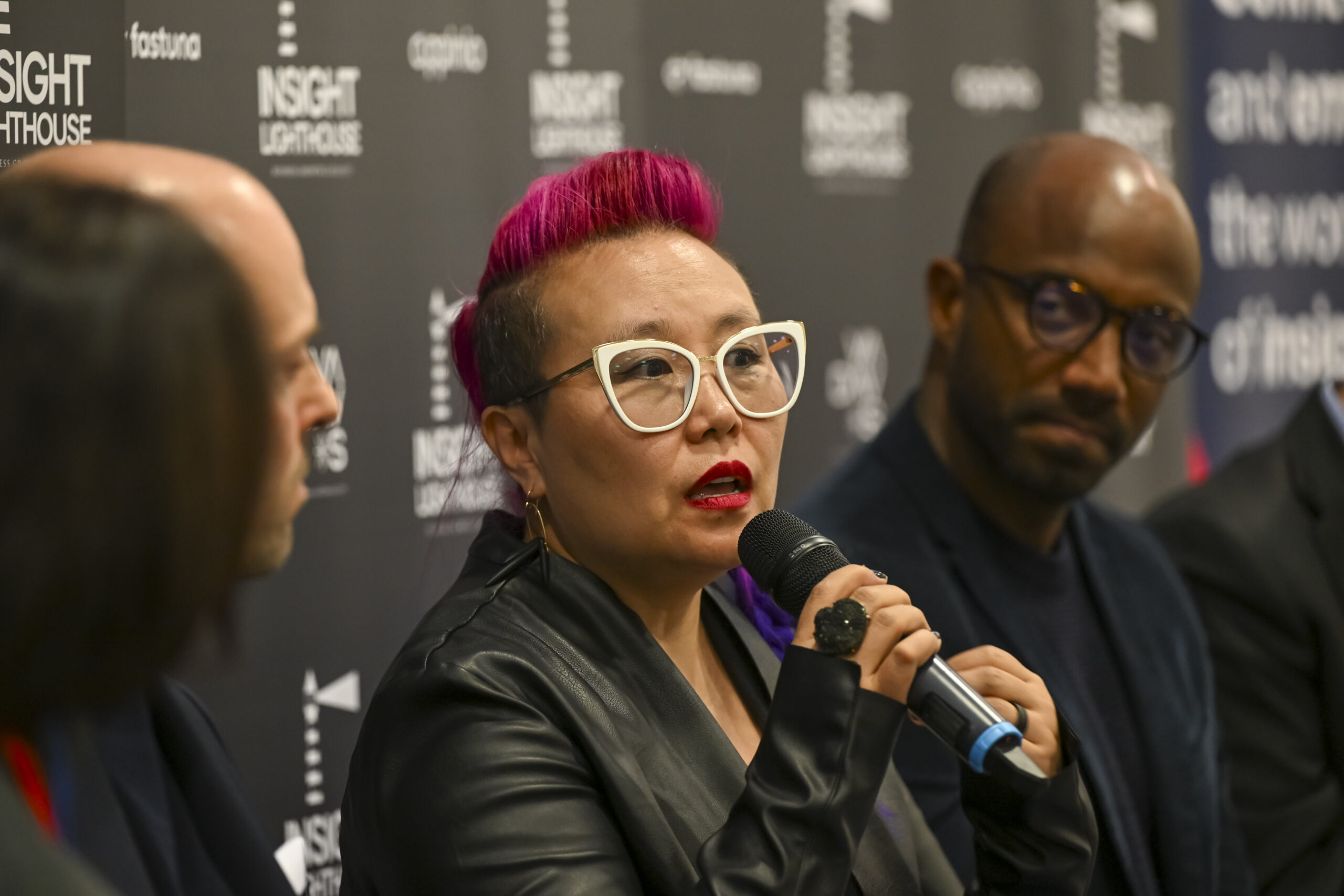
How do you perceive the role of inclusion, diversity, equity, and accessibility (IDEA) in rebuilding trust or related to the Sustainable Development Goals of the WEF at Davos and beyond?
There are 17 Sustainable Development Goals (SDGs) developed by the United Nations (UN) that the WEF often focuses on. But DEI isn’t something that’s explicitly called out on the SDGs. DEI is more than just programmatic “training or workshops” but needs to be deeply integrated with the ways and the lens all humans and businesses should look through.
There are two parallel paths that have to happen in DEI. There’s the personal growth and level of understanding. Then, there’s the organizational proficiency around DEI and practical ways you integrate systems and policies, which affect how you make decisions. On the business side, you have to focus on system changes within organizations so that you continually combat the systemic issues. However, even if you’re deeply conscientious and a deeply integrated person around DEI it doesn’t necessarily mean that you know how to create changes at a business or systems level. That’s why DEI and DEI practitioners are needed.
Kimfer speaking at the 2024 Cannes Lions event. She is holding a microphone in her right hand, wearing white-framed glasses, and has her hair styled with a pink and purple gradient. Kimfer is dressed in a blue top, a gray and white striped blazer, and white trousers, standing in front of a large presentation screen displaying details of the event.
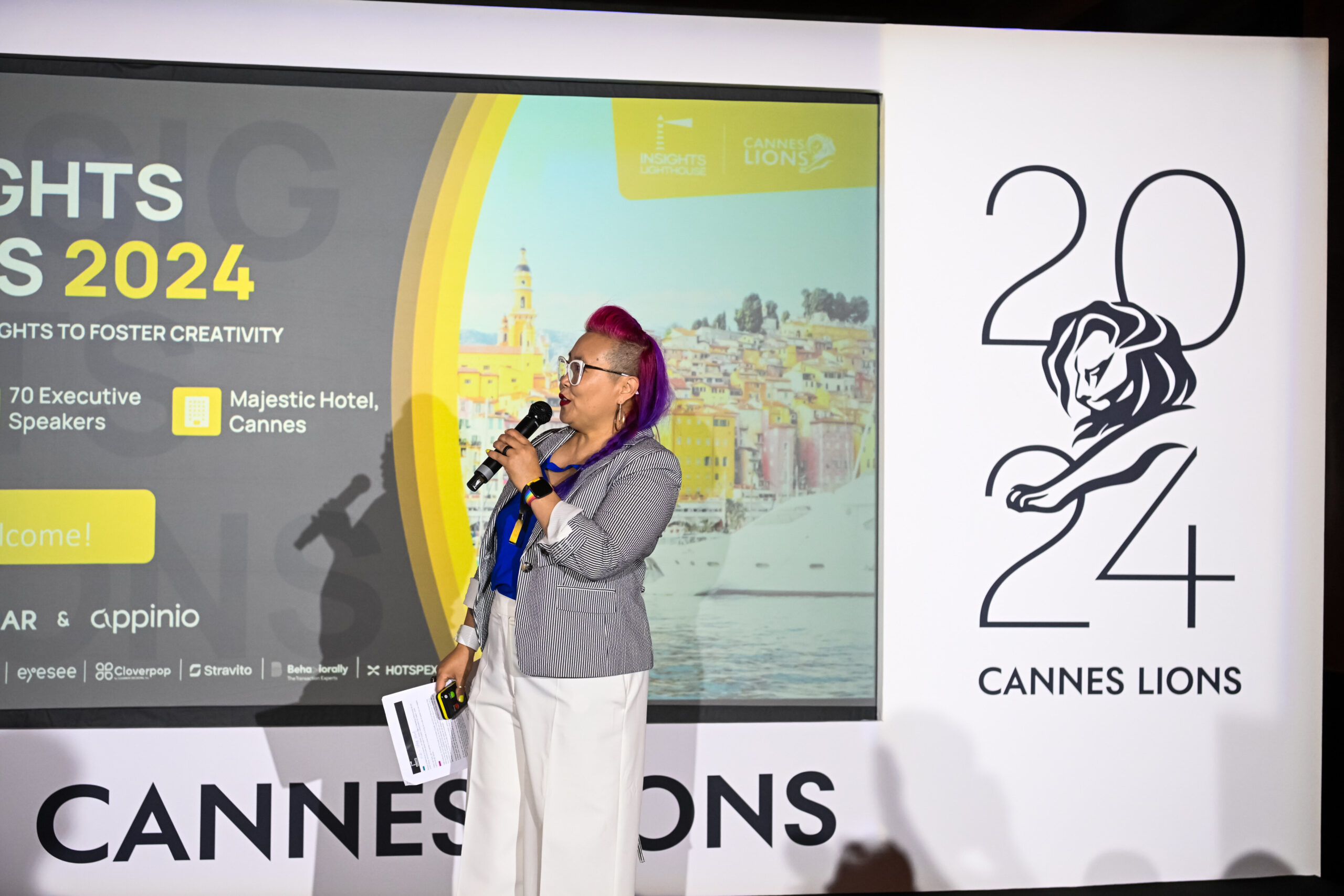
We heard you also attended the Cannes Lions International Festival of Creativity in Cannes, France, in May of this year. Can you tell us more about how this happened?
One of the events I attended at the WEF at Davos this year was the Davos Can, the only DEI-focused event of its kind at Davos. The Diversity Collective and the Inkwell Beachas have been showing up at Cannes Lions called Cannes Can events. I was blown away by how they approached their DEI event and wanted to get involved. I had the good fortune to connect with the Founder, Adrianne C. Smith, and was invited to speak at Cannes Lions on their stage about how creativity has no age limit.
In addition, the Insights Lighthouse team decided they were going to Cannes Lions for the first time. I had the immense pleasure of being one of the co-MCs throughout the day and spoke on the panel about women’s leadership roles and insights.
Could you elaborate on any initiatives or discussions of either event that are related to Urban ArtWorks or where you saw there was some kind of connection?
For me, any conversation about Urban ArtWorks is deeply integrated with my DEI beliefs or how I practice them. Urban ArtWorks is never far from my mind, no matter where I go or travel. I bring it up, hoping to connect the various impacts Urban ArtWorks has been able to accomplish in conversations I have with others. It’s part of who I am and what I represent. I am always more comfortable sharing Urban ArtWorks than my own business with others.
Kimfer sitting with a panel of speakers at the 2024 Cannes Lions event. She is seated, wearing white-framed glasses, and has her hair styled with a pink and purple gradient.
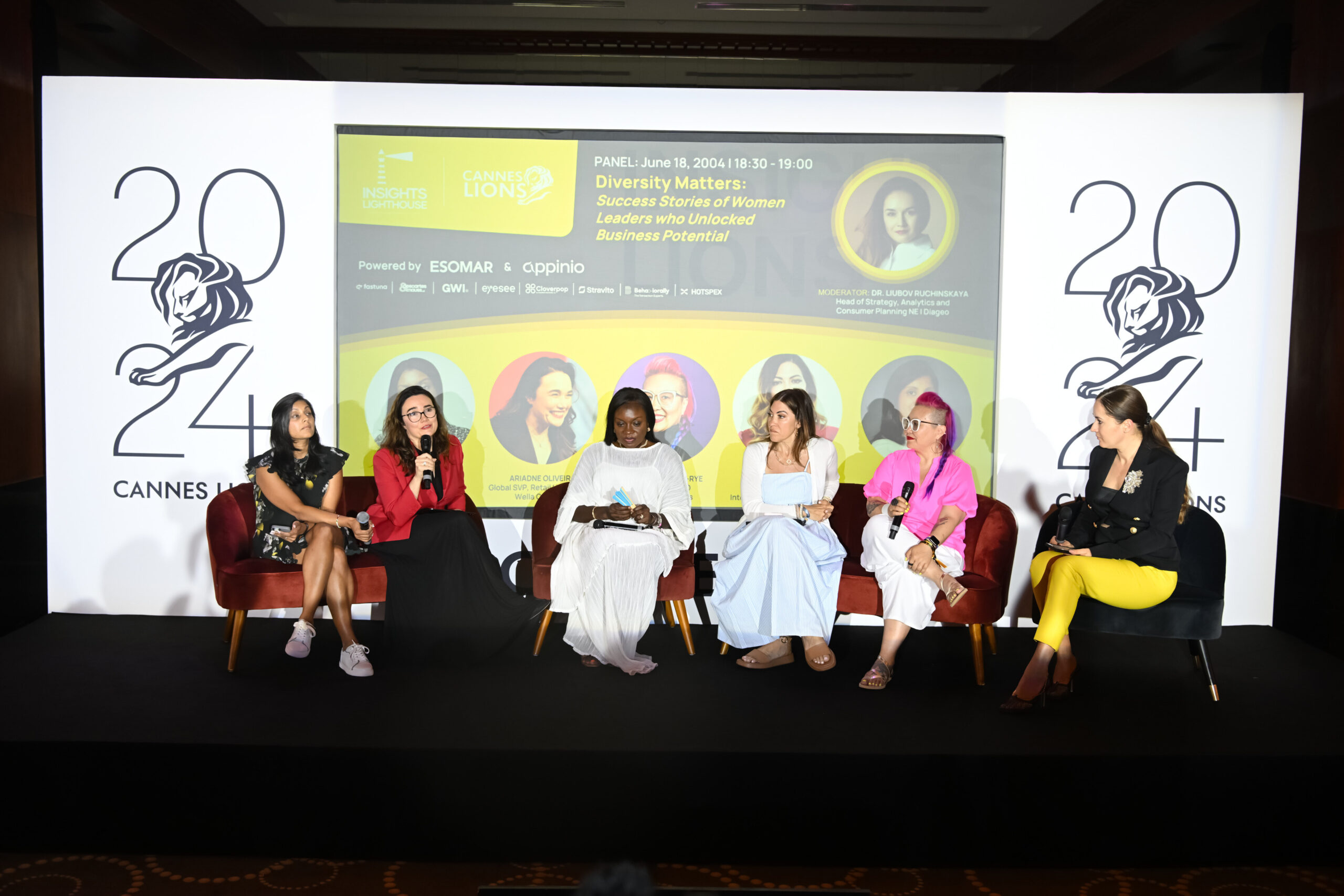
Tell us about F*Bomb Breakfast Club? That seems spicy! How is that connected to your work in DEI?
I recently purchased another company called the FBomb Breakfast Club. It’s for women, femmes, and gentlethems,who are founders, business owners, and creators. It’s a peer support group, not a traditional networking group. We focus on supporting each other to improve our businesses. I’ve been part of that community for six out of the seven years it existed. It was founded by a woman named Megan McNally, and when she considered transitioning, I expressed interest. This is the eighth year, so I purchased the FBomb Breakfast Club from her. I’m a female entrepreneur, a business owner, so that community is important to me, allowing me to be unapologetic and have DEI in the center of what we are about.
Women business owners drive so much of our economy but do not get the same loans, funding, or gravitas as our male counterparts. My DEI work is all about the underrepresented, underserved, or marginalized. I felt the F*Bomb Breakfast Club fit this bill, even if we do get spicy.
Kimfer participating in a panel discussion. Kimfer is seated in the center, holding a microphone, and dressed in a bright, summery outfit. She is wearing a neon yellow top, a white cardigan, and white pants, accessorized with white-framed glasses, a pink and purple undercut hairstyle, and colorful earrings. To her left is a panelist in an orange dress, also holding a microphone. Behind them, a large screen displays the names and photos of the panel participants, including Kimfer.
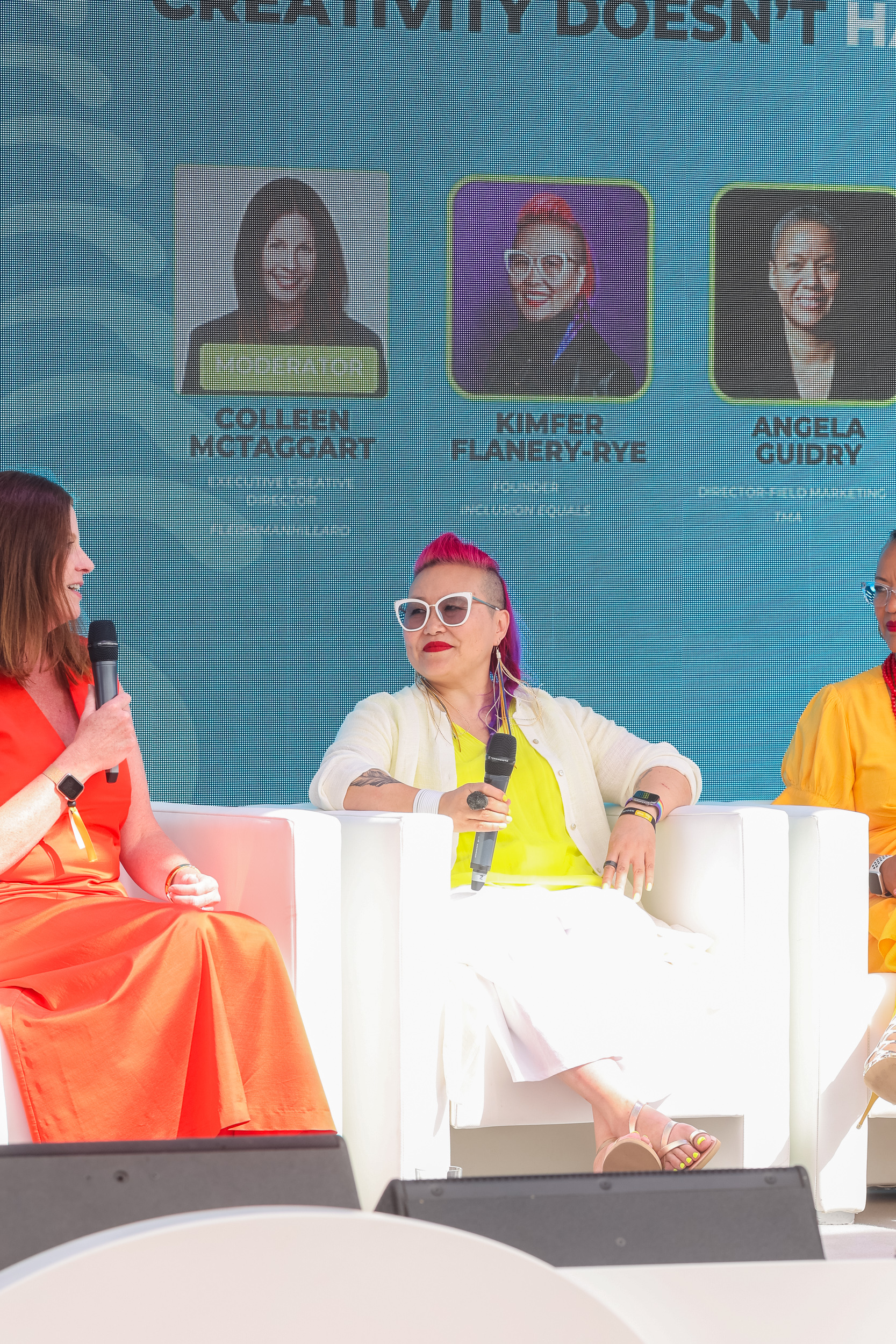
What are you most proud of during your time serving on the board of Urban ArtWorks?
Bringing a DEI perspective to the board and making it a standard will always be important to me. Knowing I had a part in the DEI chair, becoming part of the Executive Board, and always being there now is significant in our history. I’m also proud of the behind the scenes hidden operational efficiencies we’ve built.
Our previous board chair did a really great job of diversifying the board, and that’s a legacy that we’re continuing. We’ve attracted diverse board members by shifting our approach to board recruitment and membership requirements, making it more inclusive. I’m also a consultant that works for other nonprofits and often hear, “We can’t get diverse board members.” A shift in how we approach board members, board recruitment, board membership, and the requirements from financial to their experience – has opened up much more room. We also believe in helping to train new board members. Often, boards will look for past board experiences in their recrutment. How will you get experience if we don’t open up opportunities for those who want to serve?
What advice would you give to individuals interested in getting involved with Urban ArtWorks?
I think volunteering is a fantastic way to get to know Urban ArtWorks. It doesn’t matter if you have art skills; you can come to the community paint days and events, and we’ll help you. If you’re an artist and you’ve been looking for opportunities to be able to teach, we’ll also train you on how to be a teaching artist. If you are an artist interested in doing more commercial murals, and you’ve never done that before, we will also work with you. Some really phenomenal artists in our community learned how to do some of these large scale pieces through Urban ArtWorks. If you’re a business or building owner or you are in commercial real estate, you can reach out to us for murals!
Another way to get involved is just being aware as you’re walking around the city, looking for the Urban ArtWorks tag on the murals. I think the more you start seeing it, the more you’re going to see it. That’s the way our brain works. I think there’s a multitude of ways in which you can get involved as a community member. And then of course, if you don’t have the time but you have the monetary availability we always need donations.
Kimfer participating in a volunteer paint day for Urban ArtWorks, contributing to the restoration of The Jackson Street Pillars in the Chinatown-International District (CID). Kimfer, wearing a maroon jacket and a black cap, is painting a yellow design of a fish on a red pillar. She is accompanied by two other volunteers who are also working on the mural, under an overpass.
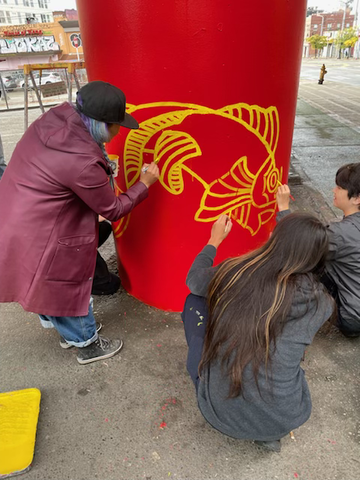
Is there anything else you’d like to share?
I have experienced a lot of various insecurities since I was really young because I was in an orphanage in South Korea before I was adopted at the age of 10. I think part of my passion for wanting to serve in organizations in those three areas that I talked about, number one being, youth that are dealing with barriers is because it comes from a deeply personal level. Not only that I survived it but that I know the various other insecurities that come with that experience. When I came to the US in the early 80s, I went through the farm crisis because I was adopted to a small farm town in Iowa. I went through another round of my family losing pretty much everything, so that’s why this work is really important to me because…
art is what really got me through it!
Although I have an MBA now, initially, it drove me to get my Bachelor of Fine Arts, with a focus on painting. I also became an Executive Creative Director and Vice President for a marketing agency and built a creative team from the ground up. Art has always been part of who I amI just always knew that I was an artist. There’s something about knowing I am an artist that was very centering because now that I’m older people tend to be like “Who am I? Am I my work?”
Although I’m not a practicing artist anymore, I know I am an artist. It doesn’t matter what kind of job I have, I will always be an artist. I bring my creativity in all kinds of ways and it has deeply influenced everything I do, even in my DEI work.
This interview has been edited for clarity and length.
This image shows Kimfer, alongside her family, participating in a volunteer paint day, helping to maintain the murals for the SODO Track project with 4Culture. Kimfer, wearing a black mask, blue jeans, and a backpack, is seen alongside two volunteers (her family), painting over graffiti on a large mural. They are using rollers to restore and refresh the artwork, which features colorful graphics and logos. The group works together on the lower section of the mural of the public art that spans the SODO Track in Seattle.
